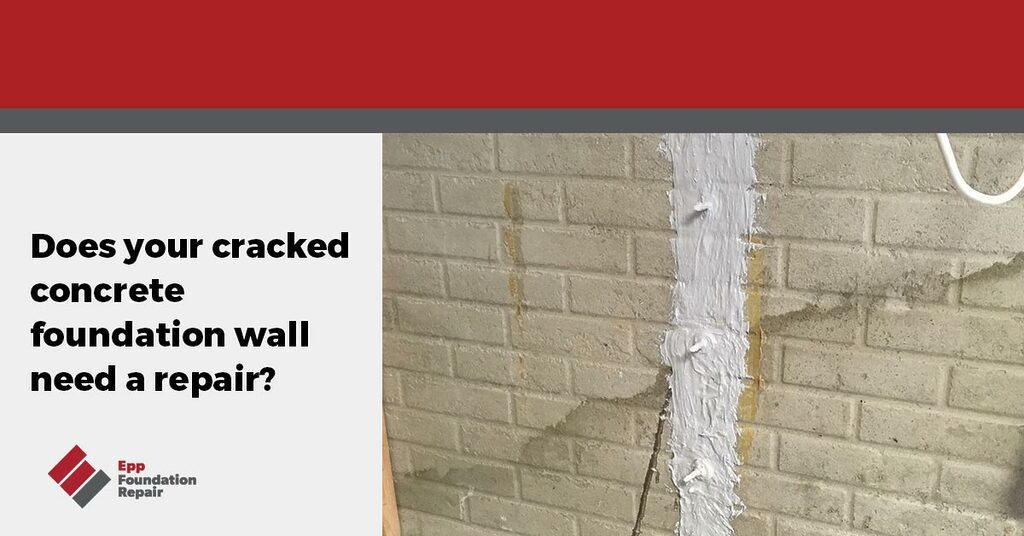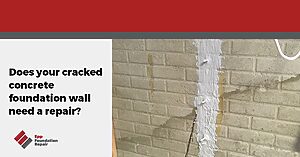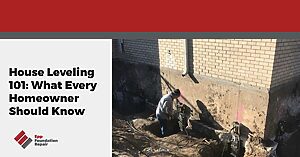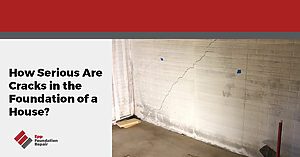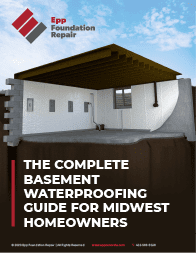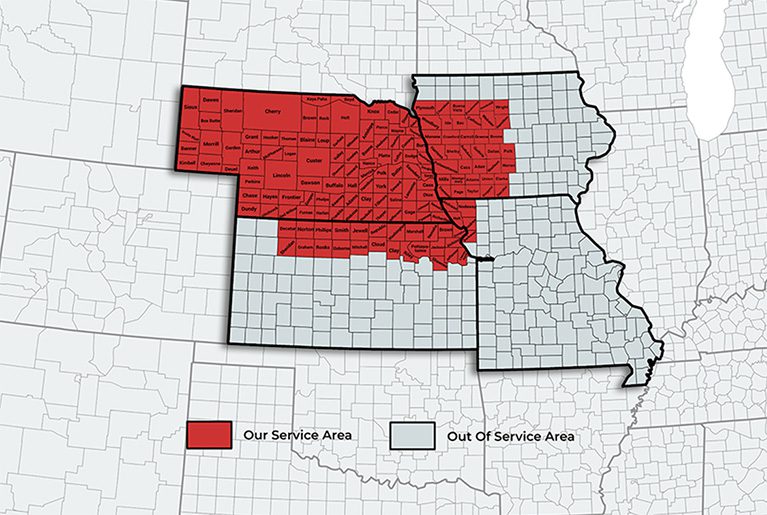While a crack in your concrete foundation wall may not always warrant a speedy repair, failing to repair structural foundation cracks can cause significant home damage and costly repairs in the future. That is why it is vital to assess the type and source of the crack in your foundation wall. Every crack tells a story; we’re here to tell you what they could mean and how to treat them.
What Are the Different Types of Concrete Foundation Cracking?
There are two main types of cracks in a concrete foundation wall: structural and non-structural.
Structural Cracks
Structural cracks are those that threaten the structural integrity of your home. Often caused by expansive soil, improper site preparation, and pooling water, these cracks require immediate attention to avoid further damage that could eventually make your house unsafe.
Structural cracks may present as:
- Cracks larger than 1/10 of an inch wide
- Horizontal or diagonal cracks
- Cracks that stretch across the ceiling and run down a wall
- Multiple vertical cracks along the same wall
- Cracks that look like stair-steps
Non-Structural Cracks
Non-structural cracks are more unsightly than dangerous, but that doesn’t mean they should be left unchecked. These cracks are usually caused by the concrete shrinking during its curing process or damage during transportation or construction. Unlike structural cracks, they should not grow over time. These cracks are dangerous because they lend themselves to water leakage in your basement, which can present future issues.
Non-structural cracks may present as:
- Hairline cracks (smaller than 1/10 of an inch wide)
- A small crack limited to one cinder block
- A single, hairline vertical crack in the foundation wall
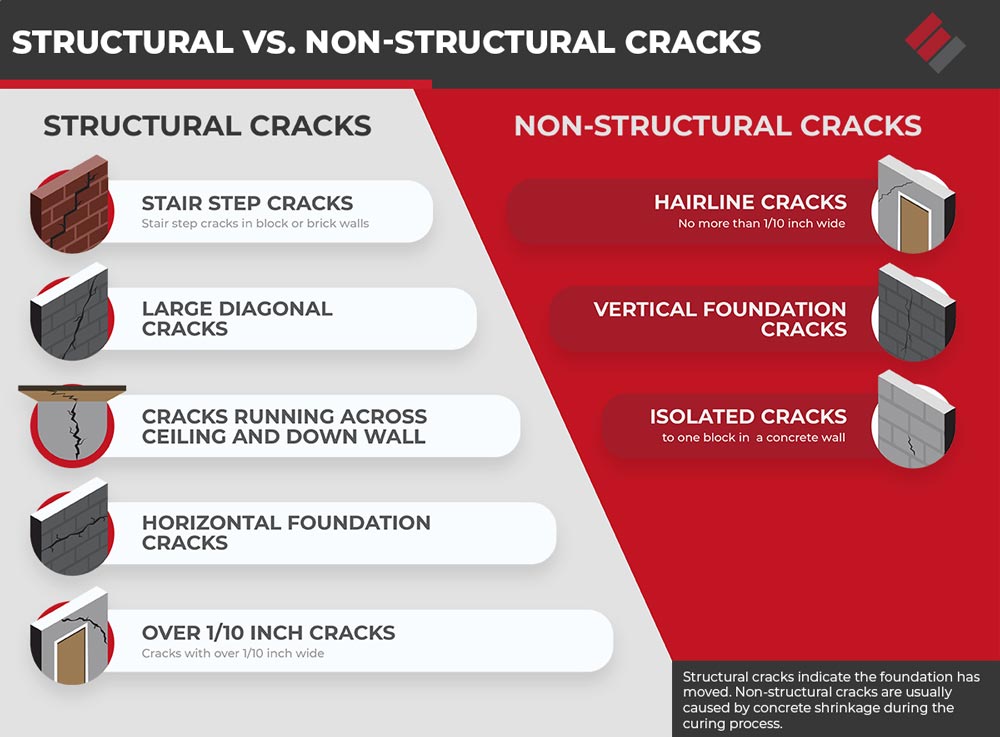
Can Repairing a Crack In a Concrete Foundation Wall Wait?
If your concrete foundation crack is structural, then it requires immediate attention. Structural cracks will only grow over time, affecting the structural integrity of your home and leading to more expensive repairs.
Since non-structural cracks do not increase in size over time, they may not require immediate repair. However, as mentioned earlier, non-structural cracks can allow water to leak into your home. Hence, it is still best to have these cracks inspected and sealed.
How to Fix a Crack In a Foundation Wall
Non-Structural Cracks
These cracks can be patched using one of the following methods:
- Epoxy Injection
This crack repair method is minimally invasive and treated from inside your home. Once the epoxy is injected, it travels through the walls to seal the entire crack. It even comes with a 2-year limited warranty.
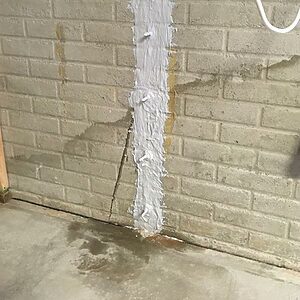
- Xypex Crack Repair
Great for sealing cracks and preventing the seepage of water or air, this repair system offers a 10-year “No-Leak” warranty. It is mold, insect, and rodent-resistant and provides a flush finish. It can even be applied to cracks experiencing active leaks or where previous patch jobs have failed. - Wall Clay Process
For cracks on the exterior of your home, this mildly invasive procedure strategically stops leaks at the source and prevents mold growth by sealing cracks using a granular clay mixture.
Structural Cracks
While structural cracks may involve the use of some of the procedures mentioned earlier, they may also require more specialized repairs, such as:
- Push and Helical Piers
Depending on the structure’s weight needing support, push or helical piers can stabilize the structure and permanently stop the foundation from settling.
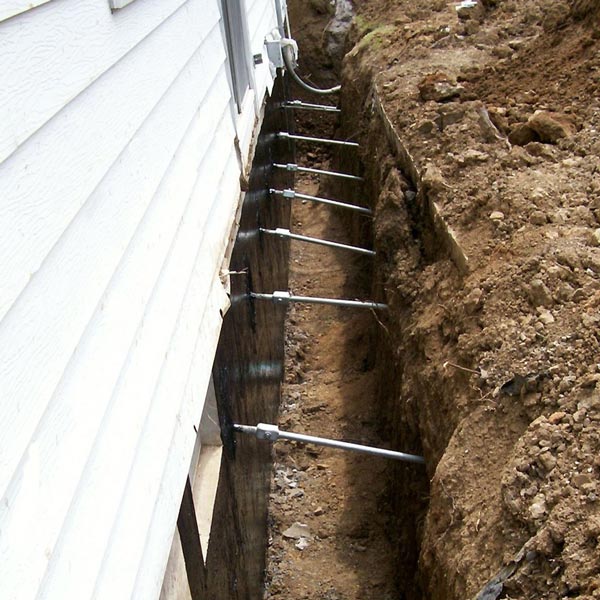
- Basement Wall Anchors, Plates, and Straps
These devices are used to stabilize and strengthen bowed or leaning foundation walls. Some tools can be installed without excavation, proving fast and minimally invasive. Our wall anchors and plates come with a 25-year limited warranty. - Crawl Space Support Jacks and Encapsulation
Crawl space support jacks help fix sagging floors, while crawl space encapsulation helps to prevent moisture from entering the home through the floors and ductwork. Aside from helping prevent structural issues, crawl space encapsulation offers health benefits, such as avoiding allergens, mold, and pests.
How Much Does It Cost to Repair a Cracked Concrete Foundation Wall?
The cost of repairing a cracked concrete foundation wall varies considerably based on the project’s scope. Patching a single leaking crack in a basement wall is much different from fixing a settled home with multiple concrete and drywall cracks.
While it is virtually impossible to determine how much it costs to repair a cracked concrete foundation wall by reading an online article or even over a phone call, our licensed professionals can properly assess your unique problem and offer a quote for the best solution. At Epp, our solutions provide immediately noticeable improvements through quick and minimally invasive techniques and permanent solutions you can trust.
Common Signs of Foundation Damage
Signs of foundation damage vary and can go unnoticed by the untrained eye. Here are a few of the most common signs.
Signs of Foundation Damage Within Your Home
- Sloped floors
- Bowed and cracked basement walls
- Cracked ceilings and floors
- Sticking doors and windows
- Gaps between the floor and the wall or the wall and the ceiling
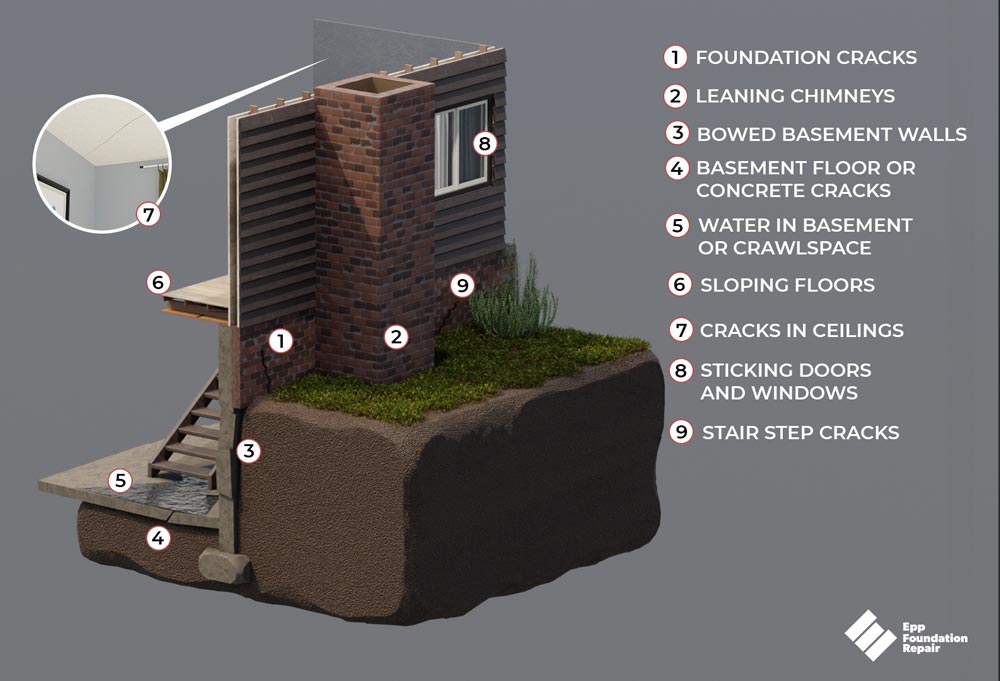
Signs On the Exterior of Your Home
- Vertical and horizontal cracks along the walls and foundation
- Cracked steps
- Leaning or cracked chimney
- Sinking or settling of the home
- Stair step cracks in brick or mortar
Not all cracks are made equal and require further assessment, starting with whether or not they are structural.
If you have a cracked concrete foundation wall, contact us today to schedule an evaluation and receive a repair estimate. We serve areas in four states: Nebraska, Iowa, Kansas, and Missouri.

